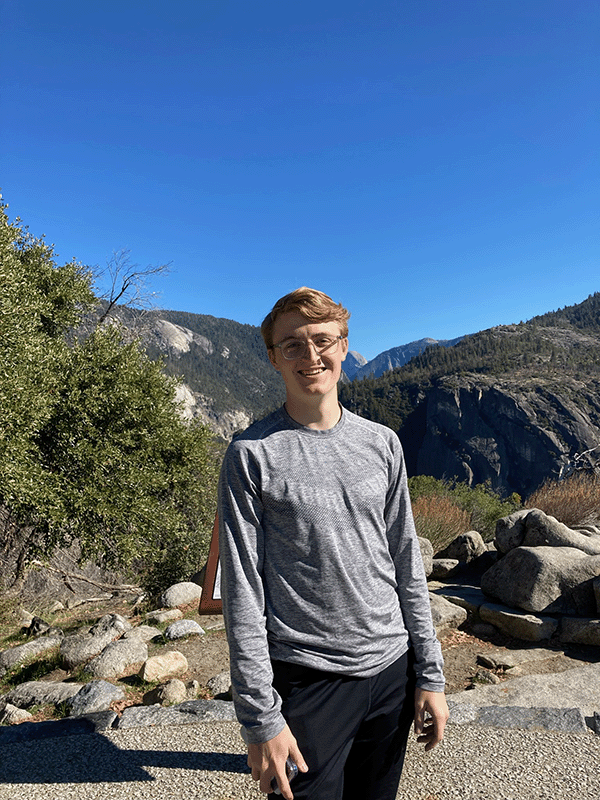
Conducting Research in the Suisun Marsh
Michael Weatherford ’23, a lifelong lover of the outdoors, participated in a research opportunity through the REAL program where he got to conduct field work in the Suisun marsh.
By Sarah Stoddard '23

Michael Weatherford ’23, who majored in environmental science and minored in biology, graduated at the end of winter quarter. Coming from Vancouver, Washington, Weatherford is a lover of nature and the outdoors. At Santa Clara University, he started Bird Up! SCU, a bird-watching club for other nature enthusiasts. Throughout his time at SCU, Weatherford was involved in environmental science research as an assistant to faculty in the department. “I’ve loved science for as long as I can remember, and it’s always been something I’ve been passionate about and wanted to pursue a career in,” he says.
During the summer of 2022, Weatherford worked with his faculty advisor to find a paid summer research project. With the help of the REAL program, he discovered the perfect opportunity that would allow him to work outside in nature and make a positive impact through his research. “I’ve been going camping with my family pretty much since I was born, so I’ve always loved the outdoors,” he says. “So once I became an environmental science major, I knew I wanted to do research in the field to hopefully make a positive impact on the planet.”
Weatherford’s research, which is currently ongoing, examines the seeds of an invasive species in the Suisun marsh known as Phragmites australis. The goal of the research is “to understand how it is spreading in the marsh, as well as if years of herbicide treatment are causing any physical difference in germination rates,” he explains. Weatherford’s experiments have involved looking at the viability of these seeds by collecting them from the marsh and replanting them in wetlands conditions to see how many germinate. The team is also determining whether herbicide resistance is developing in areas with heavier herbicide use. For both of these experiments, Weatherford utilized the greenhouse on campus at SCU.
The field and lab work Weatherford is conducting is impactful because there is a lack of research on phragmites in California, and working to save the biodiversity in the marsh is an important task. “There is a strong ecosystem services benefit to controlling phragmites because of the use of the marsh by private landowners for duck hunting,” Weatherford says. “Phragmites prevent ducks from landing in those areas.”
Although Weatherford found the experience rewarding, working amongst the harsh conditions of the marsh was certainly a challenge. He found that the research took a lot of planning and attention to detail, as well as adaptability to deal with the heat and the hands-on and often messy aspects of field work. But from 10-hour days of collecting samples in the field to long, tedious hours spent in the lab, the experience has been both rewarding and successful so far. “The most rewarding part has been seeing all the hard work of planning finally become something tangible. It was many months of meetings and discussions before we went out into the field, so getting to finally be out there and collect samples was a very rewarding moment,” Weatherford says. “Although, I think we’re still very much in the thick of it, and the real reward will be once we have results.”
As a recent graduate, Weatherford plans to work in several different labs before attending graduate school. His experience with the REAL program was highly beneficial in helping him determine his future career path, giving him insight into the aspects he enjoyed as well as the areas he found overly tedious. “It made me more certain that I want to do research for a career and opened up some different possibilities,” he explains. “I think it also confirmed for me that I don’t want to do research in a marsh just because of the harsh conditions.”
Weatherford recommends the REAL program to other students who are interested in participating in research at SCU. “I would tell people to utilize the program so they can do something they're truly passionate about as there aren’t a lot of chances to get to do that,” he says.
About the REAL Program
The REAL Program provides paid experiential learning opportunities for undergraduate students in the College of Arts and Sciences. Developed to allow students to discover their interests, gain a rich understanding of a particular field, discern their career goals, and explore future employment fields, the program has distributed roughly $2.2 million to more than 550 students across all majors since its inception in 2018. Placements range from non-profit and community service organizations to research labs, governmental organizations, and beyond.